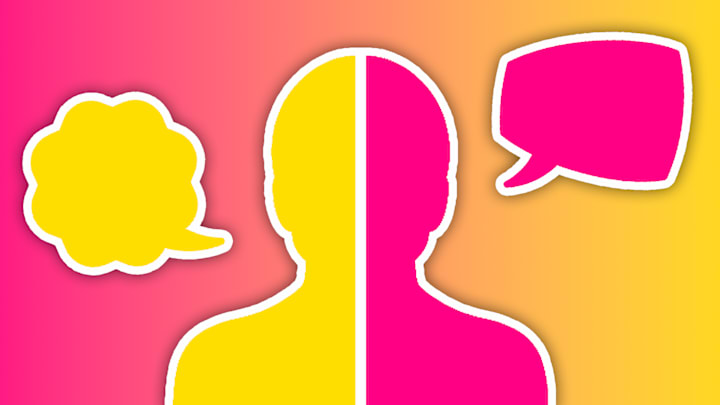During a recent congressional hearing on child welfare, Paris Hilton took a moment to compliment New York Representative Claudia Tenney. “I love your jacket, the sparkles are amazing,” she said, telling Tenney she’d like to “find out who made it later.”
The aside garnered some attention on social media, not for what Hilton said but for how she said it—or, more specifically, how her voice changed when she returned to her testimony. Suddenly, Hilton’s pitch dropped, and the vocal fry so noticeable a second earlier more or less disappeared.
Hilton had spoken differently when addressing an individual in a friendly capacity than when addressing the whole room in a formal one. In short, she code-switched. It’s something we all do in some way or another—but the exact how and why varies from person to person and from situation to situation.
What Is Code-Switching?
Code-switching is a linguistics term for the practice of tailoring our language to our social context, like speaking only Spanish at home and only English at school. But that’s code-switching at its most basic. If, say, you speak Spanish and English and you’re with people who also speak Spanish and English, you might engage in what’s called “intra-sentential code-switching,” or mixing both languages within a single sentence. For example: Pero why can’t I clean my room mañana? (“But why can’t I clean my room tomorrow?”). You can also shift between dialects, which is common among Black Americans who speak AAL (African American Language, a.k.a. African American Vernacular English) in social contexts but may forgo it in formal settings.
At this point, though, code-switching has transcended official languages and dialects and become a colloquial catch-all term for any kind of socially motivated shift in language (whether intentional or not). Does your voice creep up a couple octaves when you talk to babies (or dogs)? Do you catch yourself pronouncing water as “wooder” after a few days with your Philadelphia relatives? Do your work emails bear almost no grammatical or lexical resemblance to the DMs you send your best friend? Those scenarios all involve code-switching.
In fact, to plenty of scholars, code-switching transcends language altogether. Psychologist Kia-Rai Prewitt defined it for the Cleveland Clinic as “a way of changing your style, dress, or maybe even language or behavior, in order to match what you think would be appropriate or would make someone else feel comfortable.”
Why Do We Code-Switch?
Prewitt’s definition touches on why code-switching can be problematic: People often feel forced to bury elements of their identity—racial, ethnic, religious, gender, etc.—in order to prioritize other people’s prejudices over their own comfort and/or avoid getting stereotyped. Examples of this, per the Cleveland Clinic, include “cover[ing] up traditional tattoos—like Inuit kakiniit or Māori tā moko—to fit in with others,” using a nickname so people don’t have to learn how to pronounce your real name, not wearing your hijab or yarmulke “to avoid attracting unwanted attention,” and “adjusting [your] vocal cadence to ‘sound straight.’ ”
Constant pressure to code-switch in this way is stressful and exhausting, especially when you feel like your professional and personal opportunities—or even your safety—depend on your ability to keep it up. “For people who intentionally code-switch in school or workplace environments, they experience a heightened stress response,” psychologist Myles Durkee told the University of Michigan’s LSA Magazine, “and it’s accompanied by a degree of self-doubt about their code-switching ability: ‘Am I doing it right? Is it working? Should I continue this performance?’ All of this occurs while these individuals simultaneously perform their regular duties and responsibilities. Over time, this becomes a significant emotional and cognitive burden.”
That said, not all code-switching falls into this category. We often code-switch, especially linguistically, without even knowing we’re doing it. In 2013, NPR listener Lisa Okamoto, who was born and raised speaking English and Japanese in Los Angeles, recounted a story in which she got so terrified at a haunted house in Japan that she started screaming curse words—in English. “I consider myself fully bilingual, but I realized at this moment that, when I’m in a fight or flight/survivor instinct situation, my mind switches to English,” she wrote.
Your mind also might switch to a certain language or dialect because it’s the best one for the job of expressing a certain idea or concept. AAL, for example, has a verb form called the “habitual be.” He be working doesn’t mean that he’s working right now—it means he’s often working or he has a tendency to work. Standard English simply can’t capture that sentiment as economically or as evocatively as AAL can.
There are countless other reasons we code-switch in language, behavior, and appearance. And while it can sometimes seem a little startling to watch someone adopt a different affect or accent mid-speech—like Paris Hilton did—what’s important to remember is that it’s not “fake.” It’s just code-switching, and everyone does it.
Discover More Stories About Language:
